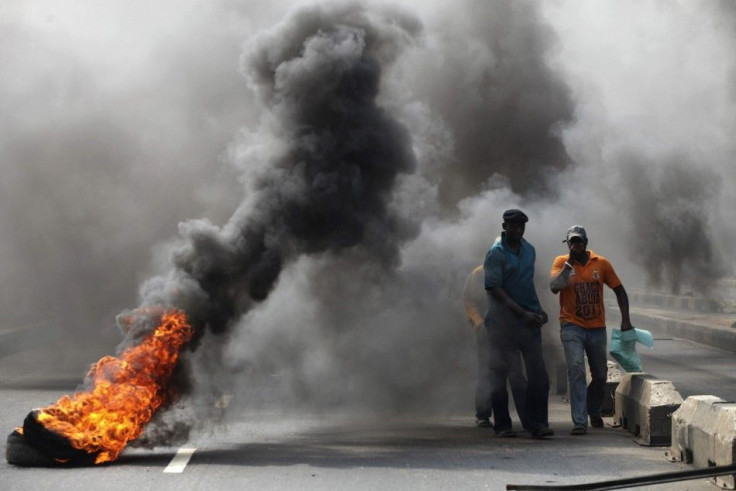Nigerian Protesters Shut Down Gas Stations After Fuel Subsidy Removal

At least one person was killed Tuesday during protests in Lagos, Nigeria, where thousands gathered to demonstrate against the government's removal of a fuel subsidy.
In Lagos, the former capital, economic hub and most populous city in the country, marches shut down a major highway while other protestors built barricades out of burning tires while closing and damaging gas stations. Police used tear gas to disperse mobs, according to officials, and witnesses say a man was shot dead by police officers, who were photographed carrying semi-automatic rifles.
Elsewhere in Nigeria, protestors hijacked a bus in order to block a road and demonstrators filled public spaces in the cities of Ibadan, Lokoja, Nasarawa and Kano.
Another man was killed in Ilorin, reportedly by police firing tear gas. However, Kwara state police spokesman Dabo Ezekiel told the Associated Press the man died after being stabbed by a motorcycle-taxi driver.
The removal of the two-decade old subsidy has already doubled the cost of oil for citizens of the oil-rich country, and the price of gas has risen to $3.50 per gallon. Additionally, taxi fares have doubled and even tripled in some cities.
Some protesters tried to convince gas station owners to stop sales, while others took matters into their own hands by dumping fuel onto the street and breaking pumps.
The oil industry is the main source of income for Nigeria and the country makes billions of dollars a year from the Niger Delta's deep petroleum deposits. However, the average Nigerian sees almost none of the revenue. The government keeps more than 90 percent of the oil money, distributing about half of that to state and local governments.
The discovery of oil in the Delta region in the 1970s led to a huge economic boom for the nation, but the standard of living plummeted and poverty rose. Nigeria's oil wealth has already led to decades of militant activity in the south, where rebel groups kill for a slice of the profit.
The removal of the subsidy will generate $8 billion in savings, according to the government, which will be invested in infrastructure improvements. Additionally, President Goodluck Jonathan has promised that Nigerians' quality of life will improve.
However, most Nigerians are more than skeptical that the savings will have any effect on their lives; rather they fear the money will be used to further line the pockets of politicians.
Despite the occasionally chaotic nature of Tuesday's protests, the movement is being led by established social activists like Chief Gani Fawehinmi -- a prominent lawyer and author -- Academic Staff Union of Universities president Dr. Dipo Fashina, and the former president of the West African Bar Association, Chief Femi Falana.
© Copyright IBTimes 2025. All rights reserved.





















